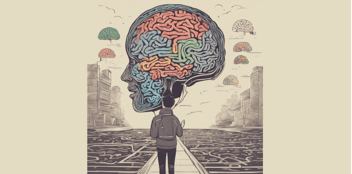Treatment-Resistant?: What to Do When Your Medication is Not Working
- Home
- Blog

Have you been diagnosed with a mental illness or mood disorder and feel your medication isn't working? You may have a "treatment-resistant" condition. It can be frustrating to not feel the relief you need. However, there is hope. This blog will cover several options you have to find the right medication for you:
- Signs of treatment-resistance: when to seek help
- Adjusting the dose of your medication
- Using genetic testing to find the medication right for you
- Misdiagnosis: when to seek a second opinion
- Additional tips to solve treatment-resistance
"Why isn't my medication working?"
Treatment-resistant is a clinical term used to describe the situation when your condition doesn’t respond to a prescription medication as expected – it may work partially, or not at all. Unfortunately, this is an all too common experience for patients diagnosed with major depressive disorder.[i] Treatment-resistance occurs in a variety of mood disorders including depression, bi-polar disorder and even schizophrenia; as well as many anxiety syndromes, such as obsessive compulsive disorder (OCD). In fact, any medical condition may present with treatment-resistance, such as a pneumonia that fails to respond to first-line antibiotics.
If you believe that your condition may be treatment-resistant, don’t despair. What is called for is a thoughtful, persistent approach, which can feel quite frustrating when all you want is immediate relief. Below are a few options you and your clinician can consider to reach a full recovery.
Adjusting the dose of your medication, or changing it altogether
You will need an adequate trial of each medication, defined as “enough dose for enough time” which will vary by type and class of medication. A psychiatrist may start you off with a lower dose to try to prevent the emergence of serious side effects, and then gradually increase it until you reach what’s called a therapeutic dose. This is the amount of medication needed before it starts having the desired effect of resolving your symptoms. If you partially respond, the doctor may augment the medication with supplements and/or an additional medication that serve as a “booster” to the first medication (it’s kind of like adding a turbocharger to an automobile engine!).
The first antidepressant may not work, even with augmentation. There are many types of antidepressants that work in different ways and on different circuits in the brain and, of course, each person may respond to them a little differently. It is important to understand that it may take a couple of attempts to find the right medication.
One way to possibly shorten this trial and error period is to consider genetic testing. This allows the psychiatrist to understand how specific genes (in your genotype) affect your response to particular treatments.
Using genetic testing to find the right medication
“Personalized medicine,” also known as “Precision Medicine,” is a medical model that uses genetic testing to help doctors more precisely select medical treatments. This genomic medicine model is now used extensively in cancer treatment, and is making its way into other branches of medicine, including psychiatry. Unfortunately, up to half of all patients respond poorly to the first psychiatric medicine they try because everyone’s body is different, partially based upon on their individual genetic makeup.[ii]
The Genomind Genecept Assay® is one tool that may help prescribe medication more precisely. Genomind looks at key “mental health” genes in your body’s DNA that affect how your brain functions and how you metabolize (break down) many psychiatric medications. This helps the psychiatrist or psychiatric nurse practitioner understand the probability of whether or not a particular medication may work before you even try it. With this information, along with a careful psychiatric and medical history, your healthcare professional will be better equipped to find the right treatments so you can feel better, faster.[iii]
When these steps have not helped you fully recover, consider the possibility that your illness has not been properly diagnosed.
Has your mental illness been misdiagnosed? Getting a second opinion
When a medication fails to alleviate your suffering, there is always the possibility that you were misdiagnosed or that one or more additional undiagnosed medical conditions (called comorbidities) may be present.
First, certain physical health conditions may cause or worsen depression, such as thyroid disorders, chronic pain or heart problems. Certain prescribed medications may also be implicated. There is also the possibility of a second or third mental health condition, or a single condition that has been misdiagnosed. For example, if you were diagnosed with depression but also have sleep disturbance and racing thoughts, it could be a bipolar spectrum disorder. Bipolar depression, for example, requires different treatment than a major depressive disorder. Finally, discuss with your professional the possibility of a personality disorder that may contribute to an incomplete recovery.[iv] When all of these steps fail to improve your condition, it is time to seek the opinion of another professional.
Not all psychiatrists treat patients in the same way even when they agree upon the diagnosis. Some have preferences for particular medications and type of psychotherapy (talk-therapy) they prefer to administer. If you have given your current treatment plan a few months and there is no improvement in how you are feeling or functioning, it may be time to seek out another psychiatrist with a different approach, that would include a thoughtful, stepwise set of interventions until you find a therapeutic regimen that’s most effective. It is imperative that you trust, connect with, and respect your doctor. Feeling that the two of you are a good fit, and that you observe a gradual improvement in your condition over time, are the “must haves” when it comes to mental health treatment. Accept nothing less!
Not recovering from your mental illness? Here are some tips.
If you’ve already tried an antidepressant or other type of medication and it didn’t resolve your symptoms, don’t lose hope. Your doctor simply may not have found the right dose, medication or combination of medications that work best for you. Here are some tips to follow in the event you have not fully recovered.
• Keep a diary of your medication use: This will expedite treatment decision-making when you seek a second opinion. The new doctor will more readily be able to understand exactly what has been tried so as not repeat ineffective treatments. Be certain to report whether or not you were fully adherent to the prescription medications, as non-adherence (failing to take the medication doses as prescribed) is a common reason for treatment-resistance.
• Consider Genetic and other Laboratory Testing: As mentioned above, this type of deeper exploration may significantly reduce the need for trial and error, uncover coexisting medical conditions, and provide further knowledge to help guide treatment decisions.
• Consider Treatment with a Different Mental Health Professional: One of the most important factors in remaining under the care of a particular psychiatrist or psychotherapist is a feeling that you can connect, respect, and trust them to be able to help heal you heart and untangle your mind. If you are not happy with how your treatment is progressing – seek out another opinion.
Related Information
- Learn about Genetic Testing
- Learn about Potomac Psychiatry
- Meet Our Doctors
- Contact Potomac Psychiatry
.png?width=144&height=144&name=Untitled%20design%20(34).png)





